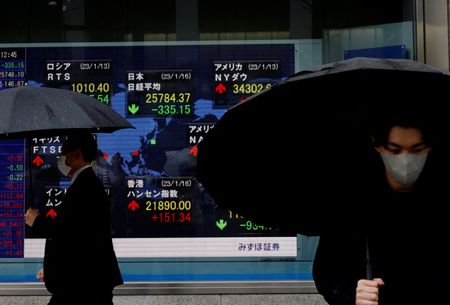 1
1 1
1

By Kevin Buckland
TOKYO (Reuters) – Most Asian equity markets edged higher on Friday, while the U.S. dollar hung near its weakest level since May, with investors fretting about the risks of a global recession as the Federal Reserve presses on with interest rate increases.
U.S. Treasury yields remained elevated in Tokyo after bouncing off four-month lows overnight. Japanese government bond yields stayed depressed, two days after the Bank of Japan defied investor pressure to loosen yield curve controls further.
Japan’s Nikkei added 0.16%, while Australia’s benchmark edged 0.09% higher, although South Korea’s Kospi slipped 0.24%.
Hong Kong’s Hang Seng advanced 0.75% and mainland blue chips were 0.32% firmer.
Asian markets showed some resilience despite a selloff on Wall Street overnight, with the S&P 500 losing 0.76%. E-Mini futures indicated a small bounce at the reopen though, gaining 0.24%.
Worries about more Fed tightening were heightened by robust U.S. employment data and fresh hawkish rhetoric from central bank officials.
Weekly jobless claims were lower than expected, pointing to a tight labour market.
Boston Fed President Susan Collins said the central bank would probably need to raise rates to “just above” 5%, then hold them there, while Fed Vice Chair Lael Brainard said that despite the recent moderation in inflation, it remains high and “policy will need to be sufficiently restrictive for some time”.
Those comments by “usually reliable Fed dove” Brainard in particular are “compounding rate hike fears,” said Tony Sycamore, an analyst at IG.
“For her to come out and say we still need higher rates, it really sparks the idea that the Fed really wants to deliver the 75 basis points of rate hikes that it projected back in December.”
“The labour market is just a little too hot to back off,” Sycamore added.
The market bets the policy rate will been just below 5% in June, implying just over 50 basis points of additional tightening.
Meanwhile, the dollar index, which measures the greenback against six peers, including the euro and yen, was little changed at 102.10, holding close to a 7 1/2-month low of 101.51, reached on Wednesday.
The benchmark 10-year Treasury yield was around 3.4% after bouncing off the lowest since mid-September at 3.321% overnight.
Equivalent JGB yields were flat at 0.405%, holding around that level since getting knocked back from above the BOJ’s 0.5% policy ceiling on Wednesday, when the central bank refrained from further tweaks to its yield curve controls.
Elsewhere, crude oil prices continued to rise. Brent futures for March delivery gained 48 cents, or 0.6%, to $86.64 a barrel, while U.S. crude advanced 54 cents to $80.87 per barrel, a 0.7% gain.
(This story has been corrected to change the Hang Seng index’s increase in paragraph 4)
(Reporting by Kevin Buckland)